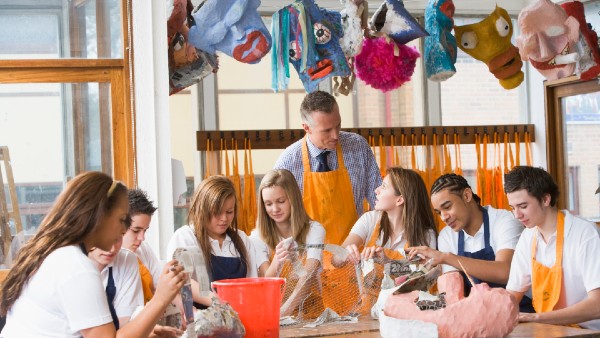RSA Chief Executive, Andy Haldane, delivered the keynote speech at the Edge Foundation’s Next Generation Assessment – Planning for the future conference on 17 January 2023. In this blog, he sets out his vision for how education might be rethought and refashioned in the face of the challenges-cum-opportunities presented by technology, demography and inequality.
Last year’s word of the year was ‘permacrisis’. You can see why: from the war in Ukraine to the cost of living crisis, from the climate emergency to our healthcare instabilities, the world is full of anxieties and fragilities in its key economic, social and environmental systems. While there is neither a simple nor singular solution to these crises, there is no question education and learning must lie at the heart of any lasting, long-term solution. As the education thinker and writer Zachary Stein said almost exactly a year ago:
Education is the root of all the more specific crises such as climate change, governance breakdowns, impending war and social unrest.
If nothing else, this underscores how high the stakes are. It also underscores the importance of rethinking and reshaping the educational landscape, as a conduit and catalyst for the reshaping of our social systems in the 21st century. Nothing less is needed if we are to prevent ‘permacrisis’ from becoming not just the word of last year, but this year and for years to come.
Andy Haldane @theRSAorg opens our Next Generation Assessment conference #ngaconf23.
— Olly Newton (@OllyNewtonUK) January 17, 2023
Education can provide a key part of the answer to addressing future crises. @ukEdge @HMC_Org @ASCL_UK @rethinkassessmt @SPGSMain pic.twitter.com/5Dl1HfXiQu
The RSA and its role
In this rethinking and reshaping of the educational landscape, I hope the RSA will play a pivotal role. We certainly have a rich history of having done so dating back well over 200 years. By responding to the societal challenges of the day, we have played a key role for more than two and a half centuries in developing educational next practice. By doing so we have expanded opportunities for many thousands if not millions of young people. From having catalysed educational institutions such as the Royal Academies of Art and Music to our role in developing the world’s first-ever programme of open, credit-carrying examinations in the mid-19th century. From our Student Design Awards (now almost a century old) to our Pupil Design Awards (now a decade old). From our role in setting up the RSA Examination Board 150 years ago – now OCR – to the RSA Academies we ran earlier this century. If this is the past and present, what of the future?
Societal shaping forces
A useful starting point is perhaps to consider the secular forces likely to shape the 21st century and its educational needs. From a long list, let me list three of those secular driving forces. As in earlier centuries, all three could be seen as posing a near-term educational challenge, but also in opening up a significant medium-term opportunity to unlock the potential in people.

Technology
The challenge technology poses to people, their jobs and skills, is now relatively well understood. The Fourth Industrial Revolution will most likely lead to a massive skills transition in the decades ahead, one at least as large as the industrial revolutions of the 18th, 19th and 20th centuries. Most outside studies point towards between a half and three-quarters of all jobs undergoing some significant change over the next few decades. As important as this change in jobs will be changes in the skills needed for the future world of work.
This skills shift will need to be at least as large as in the past if we are to escape the clutches of the machine and avoid the effects of AI displacement. Again, most studies suggest this technological transition is likely to increase demand not only for higher-level academic and technical skills, but also vocational and interpersonal skills - skills that cannot be as easily replicated by robots, even sentient ones.
In the face of this searing jobs and skills transition, however, we should not overlook the vast opportunities new technologies present educationally, in particular digital and AI technologies. Thus far in human history, the main constraints on learning have been hard constraints – numbers of teachers and schools. Technology has loosened these constraints, if not removed them, and will do so to an increasing extent in future. For example, AI means that completely personalised learning, fine-tuned to our individual learning styles and neurologies, is now well within our technological grasp. As I discuss below, this could be potentially transformative for how we teach and learn, unlocking the potential of many more people.

Demography
People born today will plausibly live 100-year lives and have 70 or 80-year careers. Taken alongside the technology-driven jobs and skills transition, that means many people will need to undergo multiple transitions, not just in jobs but in careers in the future. Making those transitions, we know, can be tougher the older you are – old dogs, new tricks and all that. This will put a much greater premium than ever before on making lifelong learning a practical reality. If we were to do so successfully, that would open up huge potential gains, expanding the workforce with experienced people, their skills renewed and refreshed, while boosting the wealth and wellbeing of those people. That is a big prize.

Inequality
The evidence is now very clear that educational differences are seeded in early years – if not before – and grow through the lifespan. Among the adverse consequences of this educational inequality are rising inequalities in opportunity, income and wellbeing through the life course. Many people leave education loathing, not loving, learning – the worst educational endowment possible. This means those often most in need of lifelong learning – because they leave the education system under-skilled – are also those least likely to engage in such learning subsequently. That embeds and amplifies educational inequalities. And once lifelong learning becomes a necessity, these costs for learners lost to the system will be even greater than in the past.
Some of this inequality in educational opportunity and outcomes arises, in my view, not from innate ability or aptitude or intelligence but instead from the particular model of learning that remains standard in most schools – the “chalk and talk” model, assessed through examination. This learning model simply does not work for many talented people. Research from the RSA in November 2022 confirmed the many different learning styles individuals have and the different cues, motivations and techniques needed to nurture a love of learning. For many of them, the standard learning model generates fear and loathing about learning, not lifelong love. The opportunity this presents is that, if in future we could personalise learning to individual learning styles and neurologies, then we should be able to unlock the potential in many more people, otherwise lost to learning. This would be the best possible endowment an educational system could give someone. It could provide the means of closing those high and rising inequalities in educational opportunity and outcome, in incomes and wellbeing. Few societal prizes are larger.
21st century education model
Against this backdrop, what can we say about the sort of education model we might need to avoid the pitfalls – and maximise the opportunities – presented by the combination of technology, demography and inclusion in the 21st century? Well, one thing we can say with confidence is that this is unlikely to be the education model that has served us well for the past two centuries – a model of priming young people with academic skills, using big blocks of physically-delivered and examination-based learning.
It strikes me that both “what” and “how” we learn will need to undergo a fairly significant overhaul if we are to surf the technological, demographic and inequality waves crashing over us. That, I suspect, will mean seeking to nurture, recognise and reward what are often invisible skills or capabilities – beyond the academic and vocational - essential to, but also transferable across, the future world of work.
That would include creativity and entrepreneurship, resilience and problem-solving, communication and negotiation, empathy and tolerance. It would mean, most likely, developing those skills in a team rather than individual settings, using experiential rather than examination-based techniques. It would mean modular or granular learning. rather than in the big blocks, fusing work and learning on a lifelong basis. It would mean devising and executing personalised learning journeys, AI-attuned to our individual learning styles and circumstances and often digitally delivered. And it would mean capturing these lifelong learner journeys in digital learner logs and recognising and rewarding them through digital badges.
A system shift in education and learning
I recognise each of these measures, individually, would be a significant step. Taken together, they would be a giant leap, a system shift for education and learning, the like of which we probably have not seen for a century or more. But even the longest journey starts with a single step. At the RSA, as well as re-imagining this 21st-century model of education, we are keen to develop practical interventions that allow us to take those first steps along this road. Our Design for Life programme, launched last year and to be road-tested this year, is doing just that.

Design for Life
Read our mission enabling people, places and the planet to flourish in harmony.
At its heart, this programme is about regenerating people, place and planet – the three P’s. It is about tackling the policy crises affecting our economic, social and environmental systems at their heart. It is a systems-shifting and systems-shaping mission, one that applies with particular force when it comes to regenerating people, their learning and our educational systems.
For example, we are developing a next-generation capabilities framework that better matches what will be needed to make a success of this century: a three-layer cake with foundational skills (literacy, numeracy, digital literacy) as the base layer, non-transferable vocational and academic skills as the middle layer, and transferable capabilities or attributes (from creativity to empathy), as the often invisible, and indeed often absent, top layer of the cake.
We will be developing sequenced pathways of learning in the form of a Design for Life Awards scheme – modular, team-based, experiential, capability and creativity-building – to nurture and grow, recognise and reward, those often-invisible skills needed for the lives and livelihoods of the future. To augment this work, we are developing plans for a UK-wide RSA education network, to influence children's outcomes and wider education policy and practice. And in addition, we have developed an ambitious primary schools and early years initiative to foster creativity and connection to both nature and community.
Preventing the permacrisis
Edge Foundation’s Next Generation Assessment – Planning for the future conference has set out a system-shaping, system-shifting agenda, one which has the potential to unlock the opportunity in so many more people, young and old. This should provide us with the raw ingredients we need to tackle the many-headed monster that is today’s permacrisis and help prevent it from becoming stuck in our everyday lexicon.
What do you think will shape education in the next eighty years? Complete the poll and let us know your reasons in the comments section below.
Related education content
-
We need to teach children new forms of literacy
Comment
Lazar Dzamic
Knowing how to read and write is no longer enough. Lazar Dzamic argues that we need to arm our young with new literacies, to fight narratives sold by media, politicians, religion, the entertainment industry and big business.
-
Artificial intelligence: the creative edge
Comment
Alex Soulsby
How should schools respond to AI? Alex Soulsby calls for a greater focus on the arts to help students develop their creativity, critical thinking, adaptability and emotional intelligence.
-
Invitation: Philanthropic networking event
Fellowship news
Innovation professional Jess Denny FRSA invites London Fellows to a philanthropic networking event at The Steps in the RSA House.




Join the discussion
Comments
Please login to post a comment or reply
Don't have an account? Click here to register.
I like the analogy of the three layer cake. This requires a new generation of bakers, and some redesign of the ovens too. In an era of long-life-lifelong-learning, we need skills development environments which do not accidentally discriminate against those without the immediate resources, freedoms or prior qualifications to benefit from traditional reskilling.
Was sorry to miss this keynote, not least as the Edge Foundation are sponsoring the RSA Fellows Project, STEAM Co. that I co-founded in my son's primary in Paddington 12 years ago and am now looking to roll out across the UK. At that time, the then Head of Education at The RSA, Joe Hallgarten said that there was a lot of talk about creativity in education, and complimented STEAM Co. for actually DOING something. We Champion, Inspire and Ignite Creativity in School Communities. Back in 2019, then RSA CEO Matthew Taylor said our work to champion creativity and our community engagement model were "brilliant" and pledged to help us roll it out across the UK, but then Covid struck. We're looking for RSA Fellows and other #CreativeCarers who'd like to help us Ignite a Creativity Revolution in our Schools, Work and Lives. See more about our work to date and plans here: http://www.steamco.org.uk/thersa